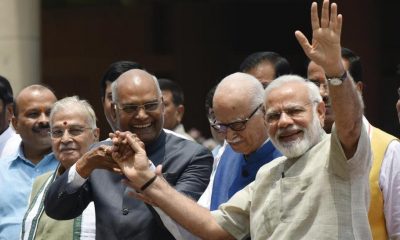World
Pope Francis announces Jubilee Year dedicated to mercy

Vatican City: While celebrating his second anniversary in the papacy, Pope Francis announced a Jubilee Year focused on one of the concepts he most often preaches: mercy.
Former Cardinal Jorge Mario Bergoglio made the revelation during his sermon at a Lenten penitential service on Friday, where the unexpected announcement won the applause of those attending the ceremony at St. Peter’s Basilica, Spanish news agency reported.
Pope Francis will dedicate the Jubilee Year to the virtue of mercy, to which he has referred on multiple occasions and which is the basis of the episcopal motto that he chose when he became a bishop: “Miserando atque eligendo” (He looked at him with mercy and He chose him).
During his sermon he said that “no one can be excluded from the mercy of god”.
The Argentine pontiff acknowledged that “I have thought about how the Church can make clear its mission of being a witness of mercy,” and concluded that “it’s a journey that starts with a spiritual conversion”.
“For this reason I have decided to declare an Extraordinary Jubilee that has the mercy of god at its centre. It will be a Holy Year of Mercy,” he said.
It will begin on December 8, the Feast of the Immaculate Conception, and will come to an end on November 20, 2016, the date when the Solemnity of Our Lord Jesus Christ, King of the Universe, is celebrated.
The tradition of Jubilee, or Holy Year, goes back to the year 1300, when Pope Boniface VIII decreed that it must be celebrated every century.
However, since the year 1475 it has been called every 25 years to allow each generation to experience at least one ordinary Jubilee, while the extraordinary ones are announced based on some important occurrence.
In the extraordinary Jubilee he has called, Francis will honour the 50th anniversary of the closure of the 1962-1965 Vatican II council and will encourage the church to continue on the path of that turning point in church doctrine and liturgy.
The pope’s announcement came as he celebrated the two years since that rainy afternoon when a cardinal “from the end of the world” appeared on the balcony of the central loggia of the basilica to greet the world as Francis.
Precisely this Friday, in an interview on Mexico’s Televisa television, the first Latin American pope made a surprising statement in acknowledging that “I have a feeling my pontificate will be brief. Four or five years, I don’t know.”
He also said he did not like to travel very much and sometimes longed for home and anonymity.
What he’d really like to do someday, he said, would be to walk out of the Vatican without being noticed and “go and eat a pizza”.
World
Lockdowns in China Force Urban Communities to Defy Censorship and Vent Frustration Online

Shanghai’s rich middle class is leading a wave of online dissent over the strict and prolonged lockdowns imposed in various parts of the country. Chinese internet censorship is struggling as patience is wearing thin in many urban centers, coming up with creative forms of online protests.
Social Media Posts Revealing Lockdown Tension in Shanghai
Drawn-out lockdowns are nothing new in China as authorities insist with the nation’s zero-Covid policy since the start of the pandemic. Currently over This time around, however, metropolitan areas like Shanghai are increasingly difficult to keep quiet, given that its more than 25 million residents have seen weeks of total isolation along with food shortages and many other service interruptions.
Dozens of towns and reportedly over 300 million Chinese citizens have been affected by lockdowns of different severity. As expected, urban netizens have been most outspoken over their difficulties by finding creative ways to get around state censorship and bans placed on topics, news comments and spontaneous campaigns.
Shanghai residents have been using mobile proxies and hijacking seemingly unrelated hashtags to talk about healthcare issues, delivery failures and the overall severity of their situation. The “positive energy” that the Chinese government wants to transmit during the recent prolonged series of lockdowns does not come naturally to those counting food supplies and online censors are working hard to filter words, trending topics and undesired social media sharing.
WeChat groups and message threads are under constant monitoring. Posts questioning the zero-Covid approach have been quickly deleted, including by leading Chinese health experts like Dr. Zhong Nanshan. Video footage is soon censored and protests and investigations are quickly made to disappear.
Where this has not worked, officials have exposed banners with warnings and outright threats like “watch your own mouth or face punishment”, while drones have been patrolling the city skies. Yet, if anything, this has led to further tensions and unspoken confrontation with Shanghai’s educated and affluent middle class.
Creative Online Solutions Harnessing Civic Energy
Announcements by Chinese social media that they would be publishing the IP addresses of users who “spread rumors” have not helped either. Tech industry research has shown that much of Asia’s tech-savvy population has a habit of using mobile proxies and other privacy tools, quickly finding workarounds to browse the internet freely and talk to the world about the hottest topics.
The sheer volume of forbidden posts is already a challenge for the very censorship system, experts explain. Unable to track all trending hashtags, state workers overlook topics that speak about the US, Ukraine or other popular news. Linking human rights elsewhere to their situation, Chinese online dissidents establish their informal channels and “hijack” the conversation to share personal or publicly relevant information about the Covid suppression in their town.
Sarcastic and satirical posts still dominate. Others hope to evade the censors by replacing words from famous poems or the national anthem. One thing is certain – social media, when harnessed with the right creativity, has proven its ability to mount pressure on the government in even some of the most strictly controlled tech environments like China.















